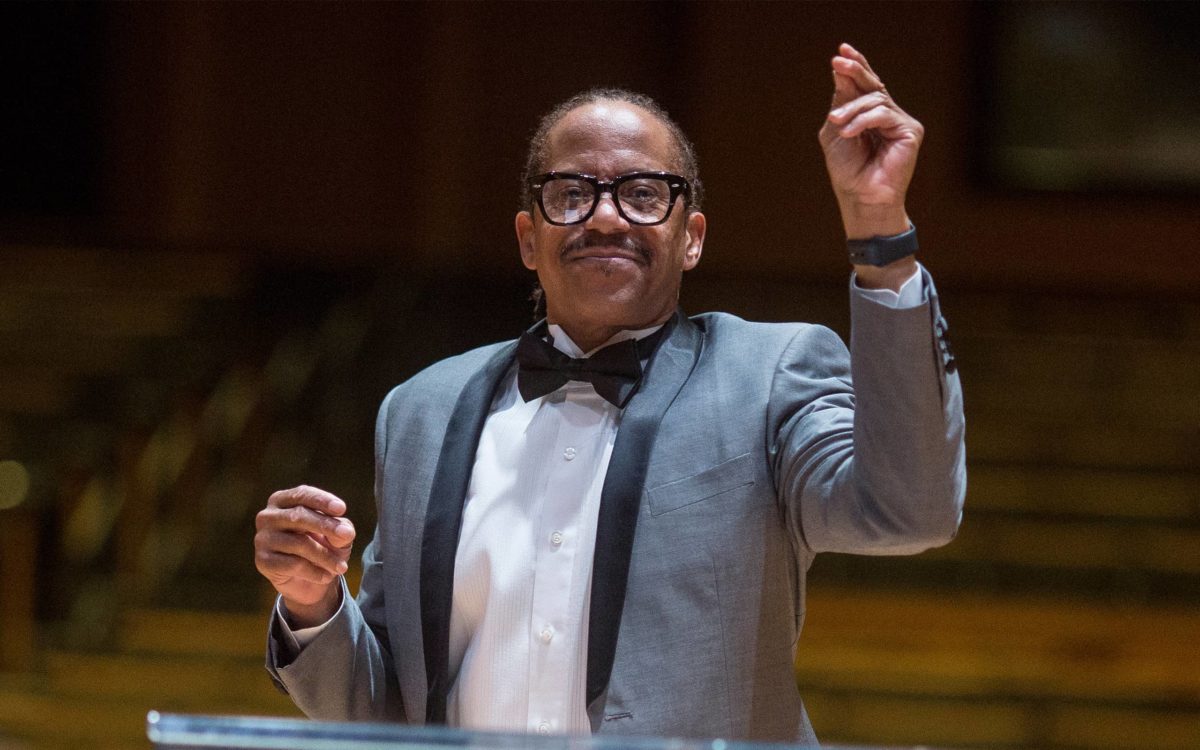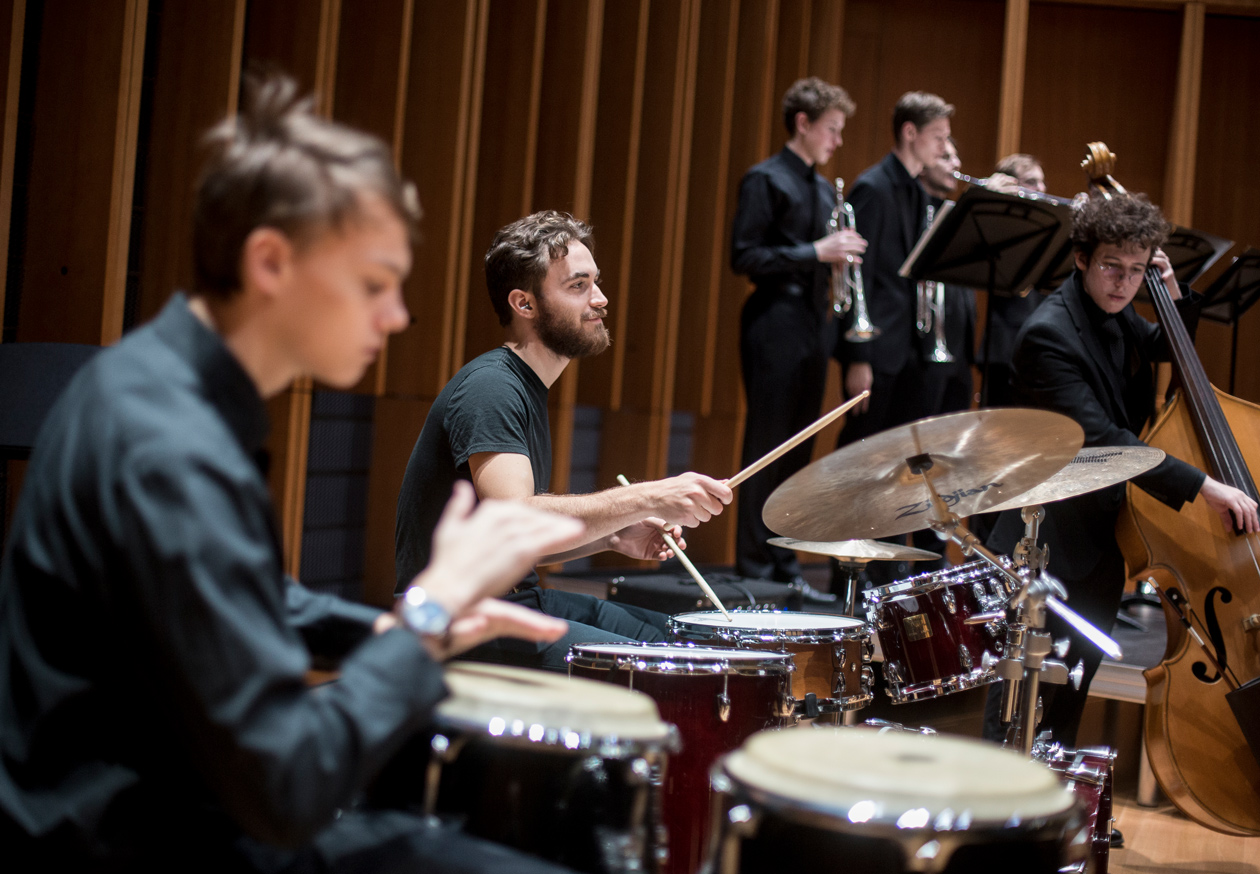Mentoring a New Generation of Jazz Musicians
Robert Shipley
Robert Shipley is widely regarded as one of the most versatile, accomplished drummers of his era. Equally at home in jazz, pop, blues, R&B and Latin genres, he began his career recording with Grammy-winning blues legend Clarence “Gatemouth” Brown and has performed around the world with Diana Ross, Natalie Cole, The Temptations, Chaka Khan and many others. He’s even authored two books on drum instruction.
So, let’s all ask the question in unison, shall we? How did this guy come to Hope College in serene Holland, Michigan, where he directs the jazz studies program?
“In the mid-’90s I moved to Las Vegas to get off the road because I was getting weary of the travel, the ups and downs of the business,” explains the assistant professor, who joined Hope’s Department of Music in 2021. “Looking at where I was in life, age, and career, a small town just seemed to be a good fit for me, somewhere I could settle down. When my dad retired, he moved home to Florence, Alabama. I guess in my mind I’ve always equated a small town in your later years as success, a smart move.”
Director of Jazz Studies Robert Shipley began his career recording with Grammy-winning blues legend Clarence “Gatemouth” Brown and has performed around the world with Diana Ross, Natalie Cole, The Temptations, Chaka Khan and many others.
While living in Vegas, Shipley became inspired to leverage his decades of experience to teach and mentor others in the next phase of his career. In his 50s, he enrolled at the University of Nevada Las Vegas to earn bachelor’s and master’s degrees in music with a jazz emphasis.
When he learned in 2020 that Hope was searching for a new jazz studies director, the first person he spoke with at the college was longtime professor Dr. Huw Lewis. “I just fell in love with him! He’s a musical genius, yet he’s one of the nicest guys, so humble.” Shipley says. “So everything just felt really good here. They’re supporting me, and everything was saying, Yeah, this is where God wants me to be.”
As the pied piper — or pied percussionist — charged with strengthening and expanding the jazz program, Shipley has initiated the Rising Artist Series, which invites outstanding high school musicians to perform alongside Hope jazz students. One goal is to inspire them to enroll at Hope and play in its premier large jazz ensemble, the Jazz Arts Collective.
“It gives our students a chance to strengthen their mentoring skills, and the high school students love it. We rehearse on Tuesdays and Thursdays, and they tell me those are the best two days of the week. So that works hand in hand both ways and strengthens the path to Hope,” he says.
To spark younger kids’ interest in jazz, in 2022 he offered free summer drum lessons at the Boys & Girls Club of Greater Holland, funded by a Mellon Foundation grant. DW Drums, with which Shipley has an endorsement agreement, supplied 10 snare drums and a drum kit.
“They have the drums to this day,” says Shipley. “Some of the students came in one day, got the free drumsticks and never came back, but about 15 students actually learned and stuck in there.”
It was many of the youngsters’ first experience with musical performance. “All you can do is introduce the arts to kids,” Shipley says. “Some will have an appreciation or a passion for it, some won’t. That’s natural. But I tried to get them interested in jazz by educating them about their heritage — how jazz was created on slave routes, through the Latino migration, Brazil and South America, and eventually made its way to New Orleans. It was fun, and in the end they did a video presentation for their families and friends.”
Sparking young musicians’ interest in jazz isn’t always easy. “Jazz is such a different language,” he notes. “Improvisation is an important element, and some students — most students — don’t know how to improvise. If you’re a classical musician you’re used to playing strictly what’s on the page. But if they know articulation but don’t understand the swing feel, I’m pretty good at explaining it and working with students. It’s a process that takes a lot of discipline. I just tell them to be patient, put the work in, and it will happen.”
Last summer Shipley put the work into completing his second drum instruction book, Complete Drum Methods for the Well-Rounded Drummer. (His first, The Art of Commercial Drumming, came out in 2020.) A Hope College Nyenhuis grant enabled him to engage a student assistant, Hope senior saxophonist Houston Patton.
“One thing I put in both books is a rhythm method I found in France and had never seen published anywhere,” Shipley says. “I saw this guy teaching it at a conservatory: rhythm exercises for high school age students in a jazz combo. It was probably something he had known from his childhood years and just memorized. It strengthens their relationship with rhythms. They’re mandatory reading material for whatever class I’m teaching.”
“As I look at my students at Hope College, I try to create as many opportunities for them to perform as possible because that’s what really helped give me an edge coming up. Hope has so much to offer, especially the Department of Music.”
Shipley has been memorizing rhythms since childhood, too. He and his twin brother formed their first band at the age of 10, and their recording-engineer father built a soundproof studio in their Chicago home for them to practice in. “We were looking to be the next Jackson 5,” he recalls with a laugh.
“There were so many opportunities in Chicago to see live music, be mentored and perform. As I look at my students at Hope College, I try to create as many opportunities for them to perform as possible because that’s what really helped give me an edge coming up. Hope has so much to offer, especially the Department of Music.”


